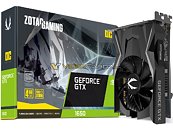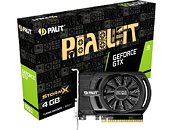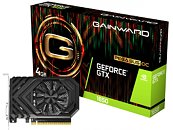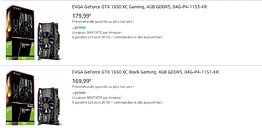- Joined
- Oct 9, 2007
- Messages
- 47,677 (7.43/day)
- Location
- Dublin, Ireland
| System Name | RBMK-1000 |
|---|---|
| Processor | AMD Ryzen 7 5700G |
| Motherboard | Gigabyte B550 AORUS Elite V2 |
| Cooling | DeepCool Gammax L240 V2 |
| Memory | 2x 16GB DDR4-3200 |
| Video Card(s) | Galax RTX 4070 Ti EX |
| Storage | Samsung 990 1TB |
| Display(s) | BenQ 1440p 60 Hz 27-inch |
| Case | Corsair Carbide 100R |
| Audio Device(s) | ASUS SupremeFX S1220A |
| Power Supply | Cooler Master MWE Gold 650W |
| Mouse | ASUS ROG Strix Impact |
| Keyboard | Gamdias Hermes E2 |
| Software | Windows 11 Pro |
NVIDIA is releasing its most affordable graphics card based on the "Turing" architecture, the GeForce GTX 1650, on the 23rd of April, starting at USD $149. There doesn't appear to be a reference-design (the GTX 1660 series lacked one, too), and so this GPU will be a partner-driven launch. Based on NVIDIA's smallest "Turing" silicon, the 12 nm "TU117," the GTX 1650 will pack 896 CUDA cores and will feature 4 GB of GDDR5 memory across a 128-bit wide memory interface.
The GPU is clocked at 1485 MHz with 1665 MHz GPU Boost, and the 8 Gbps memory produces 128 GB/s of memory bandwidth. With a TDP of just 75 Watts, most GTX 1650 cards will lack additional PCIe power inputs, relying entirely on the slot for power. Most entry-level implementations of the GTX 1650 feature very simple aluminium fan-heatsink coolers. VideoCardz compiled a number of leaked pictures of upcoming GTX 1650 graphics cards.




View at TechPowerUp Main Site
The GPU is clocked at 1485 MHz with 1665 MHz GPU Boost, and the 8 Gbps memory produces 128 GB/s of memory bandwidth. With a TDP of just 75 Watts, most GTX 1650 cards will lack additional PCIe power inputs, relying entirely on the slot for power. Most entry-level implementations of the GTX 1650 feature very simple aluminium fan-heatsink coolers. VideoCardz compiled a number of leaked pictures of upcoming GTX 1650 graphics cards.




View at TechPowerUp Main Site





